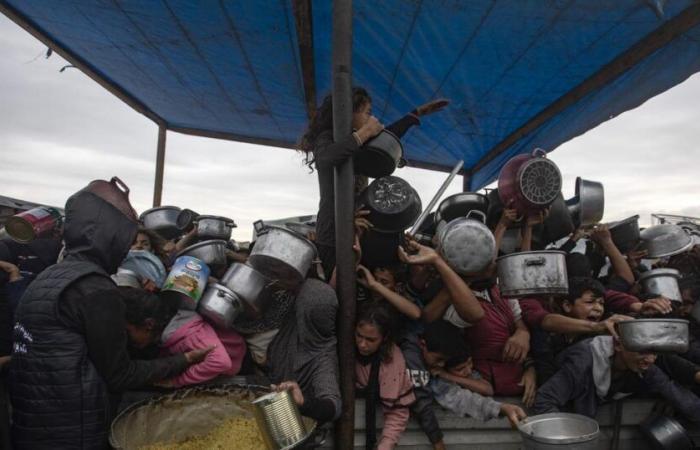Israel continues to seek to privatize the distribution of humanitarian aid in Gaza. This mission was until now that of the UNWRA, which the Israeli Parliament voted to ban on its territory.
Since the Israeli Parliament banned UNWRA, the United Nations agency responsible for helping Palestinian refugees, Israel has sought to privatize the distribution of humanitarian aid in Gaza. This decision, passed more than a month ago, raises many questions about the ethical and practical implications of such an initiative.
Who to succeed UNWRA?
The first question is which companies could take on this work. Among the first to position itself is the Global Delivery Company (GDC). “When crisis hits, GDC is there for you,” she announces in her promotional clip. Presented as capable of providing aid “24 hours a day, anywhere on the planet”, it boasts of its expertise in areas of war and disaster. Motti Kahane, its Israeli-American founder, aspires to this mission by drawing on his 14 years of experience in humanitarian aid and a team of former military personnel.
External content
This external content cannot be displayed because it may collect personal data. To view this content you must authorize the category Social networks.
Accept More info
Motti Kahane specifies: “I have former British soldiers, former American soldiers, South Africans, I have Kurds who speak the Arabic language of Iraq and Syria.” Despite its enthusiasm, the company has not yet been chosen by Israel. The competition is tough, and another company, Virginia-based Orbis, is also in the running.
Controversy over the privatization of humanitarian aid
This use of private companies for humanitarian management is not new. The United States has often used subcontracting in conflict zones, notably in Iraq and Afghanistan. The results, however, have been “more than mixed” according to some experts.
We cannot do money and humanitarian work at the same time.
Alessandro Monsutti, professor at Advanced International Studies in Geneva, explains: “In Afghanistan, private companies were not driven by humanitarian principles, safeguarding and supporting civilian populations, but by other values, which are elsewhere legitimate in the private world, which is that of making money.” He adds that it is difficult to reconcile humanitarian and profit: “We cannot make money and humanitarian at the same time.”
Use facial recognition
Motti Kahane proposes a new approach for Gaza. He plans to use facial recognition to ensure help reaches the right people. The humanitarian convoys would be made up of two parts: a first composed of civilians and a second of security agents to prevent looting. “This is the key to success,” he says, emphasizing the importance of acceptance by the local population when recruiting Palestinian partners.
However, he admits that an inappropriate military presence could arouse hostility: “If you come in as ex-military in combat gear and you go there, people will attack you immediately.” For him, “we absolutely must partner with the local Palestinian community.”
Suspicions of Israel
Despite these proposals, skepticism remains. Israel's ban on the UNWRA was partly motivated by suspicions of collusion with Hamas.
Pierre Micheletti, president of the NGO Action Against Hunger, sees this as a blatant contradiction: “Can we imagine for a second that tomorrow private boxes would be capable of not having this rate which we estimate to have been that of the UNWRA of around ten people out of the 11,000 members of its staff, who would have had documented links with Hamas?”
>> Reread the subject on the Gaza pier: The Gaza Pier is operational, but how much aid can it really receive?
Presence of UNRWA
While waiting for an alternative solution, it is still UNRWA which is trying to distribute aid, despite the restrictions imposed by Israel. The law passed at the end of October by the Israeli Parliament provides for a period of three months before the effective application of its ban.
It's been 43 days since we ate bread, because there is no flour.
The food situation in Gaza remains extremely precarious. Israel allows very few aid trucks to enter, accentuating the difficulties of the Palestinians. Nahed, a displaced Palestinian living in southern Gaza, testifies to this acute shortage: “It's been 43 days since we ate bread, because there is no flour.”
For now, Nahed and his family are surviving as best they can. But these testimonies underline the urgency of finding a viable and ethical solution for the distribution of humanitarian aid in this region.
>> Review the topic on Forum:
Radio subject: Pierre Bavaud
Adaptation web: itg






